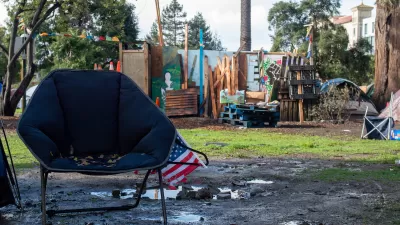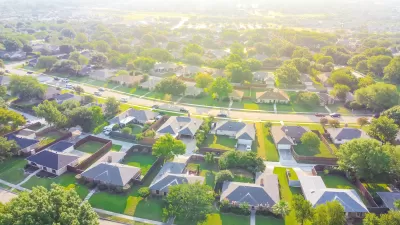Seeing "No Matter Where You're From" signs in liberal-leaning towns makes me both smile and cringe. Why? Because I know the tolerant message belies the real feelings many have towards neighbors, not from other countries, but "other" neighborhoods.
If you live anywhere with a substantial resistance to the current administration's attacks on immigrants, you may have seen the lawn/window signs–they say, in Spanish, English, and Arabic, “No matter where you are from, we’re glad you’re our neighbor.” (There’s also a variant in Hebrew, English, and Arabic.)
In an atmosphere of demagoguery and baseless hysteria about foreigners and immigrants, this kind of gesture is important (not sufficient, but important). I intend to get one.
But their popularity also makes me a little uncomfortable, and I imagine anyone else who pays attention to fair housing might feel similarly.
No Matter Where?
When I was on a work visit recently to Montclair, New Jersey, where Shelterforce's office is located, I saw these signs all over the place—on churches, lawns, and business windows. This is not surprising. Montclair is an epicenter for liberalism, well-known as a haven for (upper class) interracial couples, and the home of multiple former Obama administration officials, New York Times higher ups, foundation officials, and the like.
Seeing those signs everywhere made me smile. And it also made me cringe.
Because while the makers of the sign meant “what country you’re from,” what the sign says is “no matter where you're from,” and I know that for most of these folks, that actually isn’t true. They'll swear it is, but their actions will show otherwise.
FULL STORY: Lawn Sign Liberalism

Maui's Vacation Rental Debate Turns Ugly
Verbal attacks, misinformation campaigns and fistfights plague a high-stakes debate to convert thousands of vacation rentals into long-term housing.

Planetizen Federal Action Tracker
A weekly monitor of how Trump’s orders and actions are impacting planners and planning in America.

San Francisco Suspends Traffic Calming Amidst Record Deaths
Citing “a challenging fiscal landscape,” the city will cease the program on the heels of 42 traffic deaths, including 24 pedestrians.

Adaptive Reuse Will Create Housing in a Suburban Texas Strip Mall
A developer is reimagining a strip mall property as a mixed-use complex with housing and retail.

Study: Anti-Homelessness Laws Don’t Work
Research shows that punitive measures that criminalized unhoused people don’t help reduce homelessness.

In U.S., Urban Gondolas Face Uphill Battle
Cities in Latin America and Europe have embraced aerial transitways — AKA gondolas — as sustainable, convenient urban transport, especially in tricky geographies. American cities have yet to catch up.
Urban Design for Planners 1: Software Tools
This six-course series explores essential urban design concepts using open source software and equips planners with the tools they need to participate fully in the urban design process.
Planning for Universal Design
Learn the tools for implementing Universal Design in planning regulations.
Heyer Gruel & Associates PA
JM Goldson LLC
Custer County Colorado
City of Camden Redevelopment Agency
City of Astoria
Transportation Research & Education Center (TREC) at Portland State University
Jefferson Parish Government
Camden Redevelopment Agency
City of Claremont





























